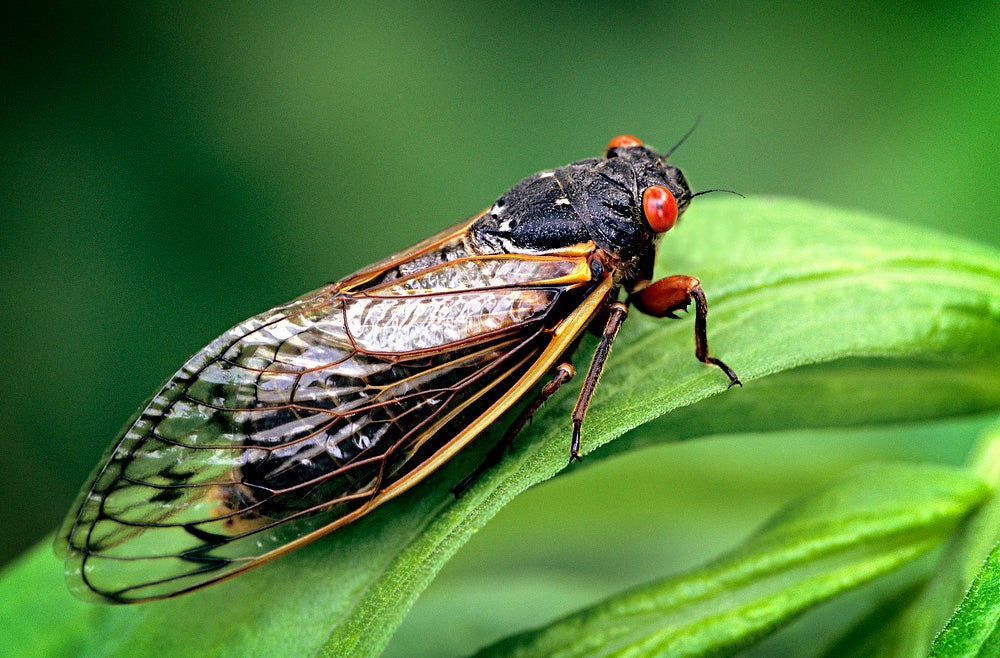Is Climate Change Confusing the Cicadas?
You might hear their chorus on a different schedule as the planet heats up.

This page was published 4 years ago. Find the latest on Earthjustice’s work.
If you haven’t heard their screams already, you will soon.
I’m talking about cicadas, of course. Billions of the shiny winged insects are preparing to emerge from the earth. This is Brood X (pronounced “Brood Ten”), an extra-large crop of cicadas that surfaces every 17 years.
From about mid-May to mid-June, the males will serenade their mates across the eastern United States, reminding some listeners of idyllic childhoods in the countryside, and others of the sound the gates of hell might make if they needed to be oiled.
Whether you find this cacophony nostalgic or distressing, you might hear it on a different schedule as the planet heats up.
This year’s cicada boom is happening a few weeks earlier than usual. That’s just what scientists say they’re expecting to see as the climate crisis advances. Cicadas hatch when the soil hits 64 degrees. These days, it’s reaching that temperature earlier in the year than it used to.
What’s more, a small segment of Brood X emerged in 2017, a full four years before they should have hatched. Cicada expert Gene Kritsky, who researches the insects at Mount St. Joseph University in Ohio, told Scientific American that climate change is the only phenomenon that could account for the early emergences he’s witnessed across the eastern U.S. He suggests that “false springs,” when the ground thaws briefly during winter and then freezes again, could be throwing off the cicadas’ internal calendars by years.
Though rising global temperatures might bring Brood X to your backyard more than once every 17 years, insect populations, many of which are important pollinators or offer other benefits to ecosystems are in deep trouble overall. One recent research study found that 40% of insect species are in danger of extinction, while another showed that the number of individual insects on earth is dropping by about 10% a decade. That’s terrible news for every other living creature on the planet, from the many fish, birds, and mammals that subsist on bugs to the humans who depend on them to pollinate our crops.
Climate change is disrupting rhythms and ways of life for many species. Some, like the cicadas are shifting their schedules; many are forced to shift geography — and it’s not always possible to find new habitat. Or in some cases, one species’ habitat shift can imperil another species: Grizzly bears must now venture farther into dangerous human territory to find food because pine beetles, which are pushing north as temperatures rise, have destroyed the seeds the bears used to eat.
These massive environmental disturbances add up to a biodiversity crisis that poses an existential threat to human civilization.
Here at Earthjustice, one of our key goals is to end the biodiversity crisis. As a nonprofit environmental law firm, we have a wide range of court cases aimed at stopping the drivers of extinction. Recently, Earthjustice has successfully challenged hundreds of oil and gas leases the Trump administration tried to issue illegally, which would have damaged essential habitats and pumped climate-heating emissions into the air. We’re now litigating to undo that administration’s efforts to hollow out the Endangered Species Act, the federal law that protects imperiled species from being wiped out.
We’re also in court fighting to ban pesticides that kill off beneficial pollinators. For almost a decade, we’ve been representing beekeepers in their efforts to stop the use of a class of insecticides known as neonicotinoids, or neonics. Even at low doses, neonics make bees terribly sick. In 2017, we won a legal victory that ended California’s practice of rubberstamping new uses for the pesticide class. Now we’re challenging a Trump administration decision that removed restrictions on a type of neonic called sulfoxaflor.
If we act now, the chorus of the cicadas doesn’t have to be nature’s death knell — even if it sounds that way. You can help us by telling the Biden administration that we need a national biodiversity strategy.
Why is a phone number required? The Biden administration requires that your letter includes certain information, including a phone number. We only ask for a phone number because of this requirement. If your letter does not include a phone number, it cannot be delivered to the Biden administration’s electronic mail system.